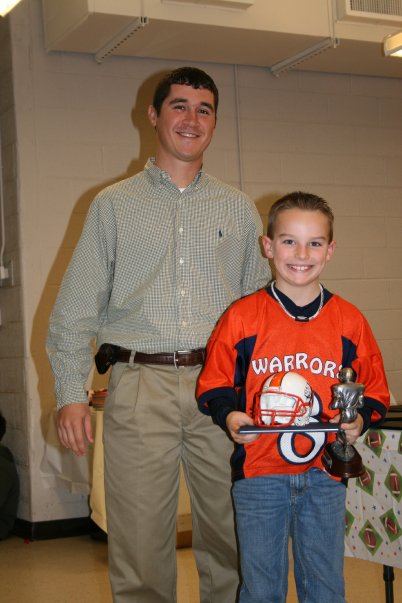Whenever a leader receives information, the full story helps. Receiving a portion of the story, missing an underlying point, or being communicated to vaguely does not help a leader in their decision making. Having the full story helps, always.
The Big Game
The scene is a highly anticipated first round matchup between the defending Super Bowl Champion Acworth Warriors and the undefeated Hillgrove Hawks. An early season loss had impacted our seeding headed into the post season tournament which created this tough first round matchup. Everything was on the line for this eight-year-old football game! Don’t judge.

My quarterback that season was a kid named Peyton. He was as solid as it got, extremely smart, and made very few mistakes. That fits perfectly into a ball control type offense. We had three running backs that could take it to the house on any play, he didn’t need to do much with his feet. My expectations of him were to get the ball handed off, throw the ball a little, and get us critical short yardage when his number was called.
The game gets off to an exciting start with the trading of touchdowns. We score, they score, we score. After a big defensive stop, we took the ball down and scored again. To that point, we had missed all of our extra points (we didn’t kick for them, you ran or threw for them), which can mean everything in a tight game. Extra points require three yards, short yardage, his responsibility.
Peyton required very little motivation and since he rarely made mistakes, I didn’t have to get on to him much either. That day was different. He could do very little right. It was time for some intervention.
The Christmas Card List
The conversation was one way. He did a lot of listening, so did someone in the stands. My words slightly lacked encouragement and I felt the need to speak up just in case the fans at the game drowned out my messaging to him!
Well…there was another person listening to the conversation, she just happened to be the woman who gave birth to him. She must have had supersonic hearing, but never confirmed. After wrapping up my spirited one-way talk, I started to walk off the field towards the sideline (coaches are on the field in this age group).
As I walked, there awaits Peyton’s father, a friend and assistant coach. He stood on the sideline with his arms crossed avoiding eye contact with me and attempting not to hear her. Over his right shoulder in the distance, his wife and Peyton’s mom was giving him the business from the crowd control fence (thank you for those). I happened to catch the tail end of the conversation that ended with, “if he (I) yells at my baby one more time, I am going to come out on to that field!” She was fairly emphatic in her messaging!
As I reached the sideline, I stood next to his dad. I slowly turned to face the field to so eagerly find out what he found so fascinating that it warranted not making eye contact with me. I breathed deep and asked him, “WHAT IS GOING ON?” After some awkward silence, he responded with, “Peyton is sick (I’m failing to disclose the actual illness because you would think less of him as a father) and I didn’t tell you, because I knew you wouldn’t play him.” After thanking him for getting me removed from the Christmas card list, we went on to win the game (and went on to win the Super Bowl, because that is a critical part of the story).
Lessons Learned
Moral of the story, pick better assistant coaches and don’t let them be your friends. The good news is we still laugh about this moment thirteen years later. I’m on the Christmas card list and I still like his father. Having the full story that day would have helped the team, prevented me from behaving like a terrible human being, and not got me yelled at in front of a stadium full of people. So…here are two leadership lessons I learned on why the Full Story Helps:
Know Your Players
I could have easily blamed my acting like a complete idiot on my knucklehead assistant coach. It would have been fully justified too! I mean, he was the kid’s father and everything. The problem was mine, I should have known my player better. We were in game eleven of the season and he had never struggled like he had in that game. Instead of my judgement getting clouded with emotion and reacting accordingly, I should have noticed something else was wrong with him.

We can get so busy in our leadership worlds, we can just simply miss it. Each and every one of our team members leaves the office and goes home to who knows what. It could be a loved one walking through cancer, a struggling marriage, a child having difficulty in school, their own depression or anxiety, financial hardships, you name it.
Many would say the burden is on the employee to tell you when something is wrong. It’s actually the burden of the leader to recognize when an employee is off. Especially those that perform consistently well for us. When they aren’t on their game, three simple words out of the mouth of a leader can be a game changer, “are you okay?” Know your players.
Be Transparent
I am okay with the knucklehead taking the fall for this one though. He should have been transparent (and could have had the courage to walk over to that fence and tell her it wasn’t my fault and not waiting until after the game). I could have adjusted the game plan, given him more rest, and called plays that did not put so much pressure on him. The problem is I didn’t know. A key portion of the story was missing.
Sometimes in leadership it can seem easier to massage the story to fit our narrative. A few carefully chosen words can make the difference between A story and THE story. I have learned over the years to just be transparent. Transparency connects in the moment and builds trust in the future. It removes the dis in dishonesty, leaving only honesty. Be transparent.
Conclusion
There were two people that acted less than smart that day, me and the assistant coach/father. We took a youth football game a little too seriously. He was a bad parent, bad communicator, and didn’t have any courage. I yelled at a sick kid and received a tongue lashing from a mother with righteous anger in front of a lot of people. The bonus lesson for today, don’t be like us!
Every have these moments in leadership? The pressure of the moment builds, things don’t go as planned, your behavior is unbecoming of a leader. You find out from someone else what the root cause of a struggling employee’s issue because you were not in touch enough to see it. Yeah…those moments. Be better.
Having the full story helps. All day, everyday.